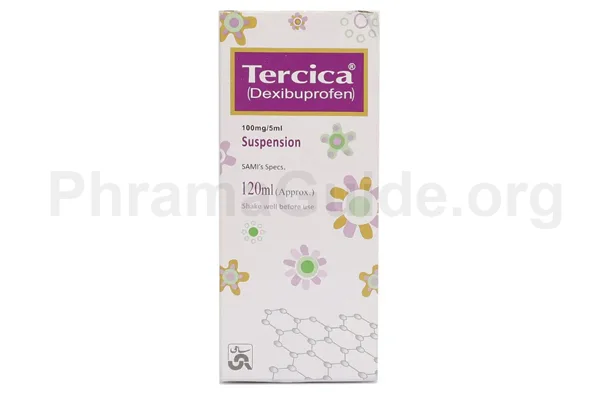Tercica Syrup is primarily used for the management of pain and inflammation associated with various conditions. It belongs to the class of nonsteroidal anti-inflammatory drugs (NSAIDs). It is mostly recommended for children and adults where a low dose of medicine is needed. The following are some common and off-label uses of Tercica Syrup:
Common Uses of Tercica Syrup
- Pain Relief: Tercica syrup is commonly used to relieve mild to moderate pain. It can be effective in reducing pain caused by conditions such as headaches, toothaches, muscle aches, and joint pain.
- Fever Reduction: Tercica syrup may be used to help reduce fever, particularly in cases where the fever is accompanied by pain and inflammation.
- Inflammatory Conditions: Tercica syrup can be used for the management of inflammatory conditions such as rheumatoid arthritis, osteoarthritis, and ankylosing spondylitis. It helps to alleviate pain, reduce joint stiffness, and decrease inflammation associated with these conditions.
- Sports Injuries and Musculoskeletal Disorders: Tercica syrup can also be used to manage pain and inflammation related to sports injuries, strains, sprains, and other musculoskeletal disorders.
Off-label Uses of Tercica Syrup
- Migraine Headaches: Tercica syrup may be used off-label for the management of migraine headaches. It can help alleviate the pain associated with migraines and may be effective when taken at the onset of symptoms.
- Dental Pain: Tercica syrup may be used off-label for the relief of dental pain, such as toothaches. It can help reduce inflammation and provide temporary relief from pain until dental treatment can be sought.
- Postoperative Pain: Tercica syrup may be used off-label for the management of postoperative pain. It can help reduce inflammation and provide analgesic effects following surgical procedures.

What is Tercica?
Tercica is one of the leading brands of Dexibuprofen in oral liquid form, manufactured and marketed by Sami Pharmaceuticals (Pvt) Ltd, Pakistan.
Tercica Alternatives : Other Similar Brands
The following are some alternative brands of Tercica Syrup and their manufacturers.
- Dexy : Tabros Pharma, Pakistan.
- Xib : S.J. & G. Fazul Ellahie (pvt) Ltd, Pakistan.
- Zibufen : Global Pharmaceuticals, Pakistan.
- Hifen-X : Helix Pharma (Pvt) Ltd, Pakistan.
- Dexact : Zanctok Pharmaceuticals, Pakistan.
- Desomin : Opal Laboratories (Pvt) Ltd, Pakistan.
- Prodex : Kaizen Pharma, Pakistan.
- Dexidol : Standpham Pakistan (Pvt) Ltd.
- Rodexib : Platinum Pharmaceuticals (Pvt) Ltd, Pakistan.
Tercica : Available Formulations and Strengths
Presently, Tercica is available in Syrup and Tablet forms with the following strengths.
Tercica Syrup : 100mg/5ml strength.
Tercica Tablet : 300mg and 400mg strengths.
Who Should Not Use Tercica?
Tercica syrup has certain contraindications. Contraindications are specific situations or conditions in which the use of Tercica Syrup is not recommended due to potential risks or adverse effects.
- Hypersensitivity or allergy: Individuals who have a known hypersensitivity or allergy to Tercica or other nonsteroidal anti-inflammatory drugs (NSAIDs) should not use Tercica syrup. Allergic reactions to NSAIDs can range from mild skin rashes to severe allergic reactions, including anaphylaxis.
- Asthma, rhinitis, or nasal polyps: Tercica syrup is contraindicated in individuals with a history of asthma, rhinitis (inflammation of the nasal lining), or nasal polyps. It can cause bronchospasm and worsen respiratory symptoms in susceptible individuals.
- Active gastrointestinal (GI) bleeding or peptic ulcer disease: Tercica syrup should not be used in individuals with active gastrointestinal bleeding or a history of peptic ulcer disease. NSAIDs can increase the risk of stomach and intestinal ulcers and gastrointestinal bleeding.
- Severe kidney or liver impairment: Tercica syrup should be used with caution or avoided in individuals with severe kidney or liver impairment. These conditions can affect the elimination and metabolism of the medication, leading to an increased risk of adverse effects.
- History of heart attack, stroke, or heart disease: Tercica syrup is contraindicated in individuals with a history of heart attack, stroke, or established heart disease. NSAIDs, including Tercica, have been associated with an increased risk of cardiovascular events.
- The third trimester of pregnancy: Tercica syrup is contraindicated during the third trimester of pregnancy as it may cause harm to the fetus and affect labor and delivery. It should generally be avoided during pregnancy unless specifically recommended by a healthcare professional.
What is the Recommended Daily Dosage of Tercica?
Tercica Dose for Adults and Children (12 years and older):
- Starting dose is 200 mg to 400 mg (10 mL to 20 mL of syrup) taken orally every 4 to 6 hours, as needed for pain relief or reduction of inflammation.
- The maximum daily dose should generally not exceed 1,200 mg (60 mL of syrup) per day.
Tercica Dose for Children (under 12 years of age):
- The use of Tercica syrup in children (under 12 years) should be guided by a healthcare professional.
How Tercica Works?
The mode of action of Tercica syrup is the inhibition of cyclooxygenase enzymes, specifically COX-1 and COX-2, which are responsible for the production of prostaglandins. By inhibiting these enzymes, It reduces the synthesis of prostaglandins, which are mediators of inflammation, pain, and fever. This results in anti-inflammatory, analgesic (pain-relieving), and antipyretic (fever-reducing) effects.

Leave A Comment